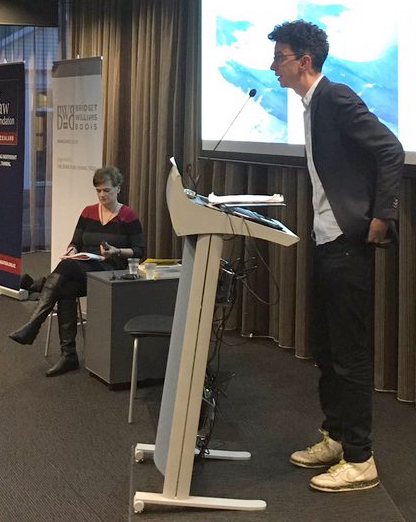Tuesday 11 April saw the launch of Max Harris‘s book The New Zealand Project at the Royal Society of New Zealand. The launch featured Harris in conversation with Māmari Stephens, discussing his ideas.

Max Harris’s The New Zealand Project book launch – photo by Yogesh Patel
One of Harris’s key goals for the book is to get people in a room to have a discussion about some of the most important questions facing New Zealand. Those questions are essentially
- what are our values?
- what do we stand for?
- who do we want to be?
Harris is seeking renewed debate of these questions, challenging New Zealanders to ask them, and to be inspired and motivated to shape and reshape the answers. This discussion, Harris says, will need to include many voices, perspectives and worldviews – especially Māori perspectives. He emphasises the need for Pākehā to listen, to learn and relearn our history, to own that history, and to take the best parts forward. New Zealand politics needs a broader, more mature and patient discussion about what we consider to be within the realms of possibility.
It is clear that New Zealand is facing some unprecedented challenges at present. Climate change, wealth inequality, growing resentment and tension between generations, declining voter engagement and the corresponding devaluing of a system of politics that has moved away from values are all posing challenges for social cohesion and progress.
At its heart, the book is about this decline of value-based politics in New Zealand. Harris posits that values and principles have been neglected in favour of a politics that is technocratic, selfish and lacking direction. He argues that, in order to reinvigorate our sense of direction, we need people in politics who are motivated by and embody their values. He points out that it is not facts that change peoples’ minds and bring them together, but values (provided they are grounded in evidence). The values of care, community, creativity and (tentatively) love are the three and a half values that Harris believes can steer the future of New Zealand in a positive direction.
In The New Zealand Project, Harris boils down his vision to 15 practical bullet points for action. One of these is to introduce civics education in New Zealand schools, which aligns with the McGuinness Institute’s finding of the 2016 TacklingPovertyNZ tour and ongoing work on the CivicsNZ project. Harris has a strong belief in allowing societal change to be driven from the bottom up. He argues that civics education is a means of achieving this by improving civic-mindedness and social capital. Harris posits that a formal civics programme in the New Zealand curriculum would help to create an informed and engaged society and address the disparities in the way civics is currently taught in New Zealand (with much discretion on the part of teachers as to how the subject should be addressed, if at all).
Harris leaves the details to be filled in by New Zealanders; what form a civics programme might take, where citizenship education would fit in to the picture and what any such programme might entail is all up for discussion. The point seems to be that discussion needs to be had, that room needs to be made for talking, listening, trying new things and even failing sometimes. What Harris is talking about is not an idealistic utopia but a project: a New Zealand project, with a part for all New Zealanders to play.
